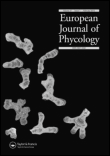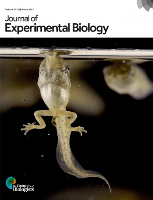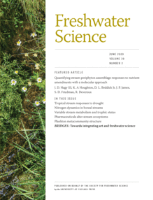
EUROPEAN JOURNAL OF PHYCOLOGY
Scope & Guideline
Innovating Research on Freshwater Flora
Introduction
Aims and Scopes
- Taxonomy and Systematics of Algae:
The journal emphasizes the classification and systematics of algae, providing detailed phylogenetic analyses and descriptions of new species across different algal groups. - Ecophysiology and Environmental Interactions:
Research articles often investigate how algae respond physiologically to environmental changes, including factors like light, nutrients, and pollutants, contributing to our understanding of algal ecology. - Biodiversity and Biogeography:
The journal frequently publishes studies focused on the diversity of algal species and their distribution patterns in various ecosystems, highlighting the importance of conservation and ecological dynamics. - Applied Phycology and Biotechnology:
There is a growing emphasis on the biotechnological applications of algae, including their use in biofuels, bioremediation, and as food sources, reflecting the journal's commitment to practical applications of phycological research. - Molecular and Genomic Studies:
The inclusion of molecular biology and genomic approaches in studies allows for deeper insights into algal genetics, evolutionary relationships, and metabolic pathways.
Trending and Emerging
- Climate Change Impact on Algal Species:
Recent publications increasingly address how climate change affects algal physiology, distribution, and community dynamics, emphasizing the urgency of understanding algal responses to global environmental change. - Invasive Algal Species and Their Ecological Effects:
There is a growing body of work focused on the impacts of invasive algal species on local ecosystems, reflecting an increased awareness of biodiversity threats and the need for management strategies. - Functional Traits and Ecosystem Services:
Emerging research is exploring the functional traits of algae and their roles in ecosystem services, highlighting their importance in nutrient cycling, habitat formation, and as primary producers in aquatic ecosystems. - Microalgae in Biotechnology and Renewable Energy:
The exploration of microalgae for biofuel production and other biotechnological applications is gaining traction, as researchers seek sustainable alternatives to fossil fuels. - Molecular Ecology and Genomics of Algae:
There is an increasing trend in the use of molecular techniques to study algal diversity and evolution, enabling researchers to uncover cryptic species and understand genetic diversity within algal populations.
Declining or Waning
- Traditional Morphological Studies:
Although morphological studies are foundational in phycology, there has been a noticeable decline in purely morphological research, with a shift towards molecular and genetic analyses for species identification and classification. - Local Species Studies:
Research focusing exclusively on local algal species without broader ecological or biogeographical implications appears to be waning, possibly due to an increasing emphasis on global biodiversity and conservation issues. - Isolated Laboratory Studies:
There is a decreasing trend in studies that investigate algal species in isolation under controlled laboratory conditions, as researchers increasingly recognize the importance of understanding algae within complex ecological contexts.
Similar Journals

NEW ZEALAND JOURNAL OF BOTANY
Advancing Knowledge in New Zealand's Botanical LandscapeThe New Zealand Journal of Botany, published by the esteemed Taylor & Francis Ltd, serves as a pivotal platform for disseminating significant research in the fields of Ecology, Evolution, Behavior and Systematics, as well as Plant Science. With a rich history dating back to 1963 and an impressive convergence extending to 2024, this journal has established itself as an essential resource for researchers and professionals dedicated to understanding the complexities of plant life and ecological systems in New Zealand and beyond. The journal is currently categorized in the Q3 quartile for both relevant disciplines as of 2023, reflecting its balanced influence within the global academic community. Although not an open access journal, it retains a significant impact factor, evidenced by its Scopus rankings, which place it within the top half of its categories. This makes it an invaluable tool for students, researchers, and academics aiming to engage with robust, peer-reviewed scientific findings and contribute to the evolving discourse surrounding botany and ecological research.

ALGAE
Bridging science and sustainability through algae.ALGAE, an esteemed publication by the Korean Society of Phycology, serves as an authoritative platform for researchers and practitioners in aquatic science, ecology, and plant science. Founded in South Korea, this journal has established a commendable reputation, reflected in its Q1 rankings across multiple categories in the 2023 Journal Citation Reports and its impressive Scopus rankings, which position it in the top 20% of its fields. With a scope that encompasses the latest advancements in algal studies, highlighting both fundamental and applied research, ALGAE is crucial for those looking to deepen their understanding of phycology and its implications for biodiversity and ecosystem health. Though not an open-access journal, it provides valuable insights and cutting-edge findings that are vital for the scientific community engaged in ecological and biological research. With its robust trajectory from 2013 to 2024, ALGAE continues to push the boundaries of knowledge and foster innovation within the discipline.

JOURNAL OF EXPERIMENTAL BIOLOGY
Innovative Research Shaping the Future of BiologyJOURNAL OF EXPERIMENTAL BIOLOGY, published by COMPANY BIOLOGISTS LTD, stands as a cornerstone in the fields of Animal Science, Aquatic Science, Ecology, Insect Science, and Physiology. With a rich history dating back to 1945, this esteemed journal has continually provided a platform for high-quality research, evidenced by its impressive Q1 rankings across multiple categories in the 2023 Journal Citation Reports. Located in the United Kingdom, it serves an international audience, offering critical insights and advancements in various biological sciences. As a non-open access journal, it provides rigorous peer-reviewed articles that contribute profoundly to our understanding of biological processes and their implications. With an extensive reach among researchers, practitioners, and academia, the JOURNAL OF EXPERIMENTAL BIOLOGY is not only a repository of knowledge but also a catalyst for ongoing research and innovation in experimental biology.

Fottea
Fostering collaboration in the vibrant realm of plant sciences.Fottea is a prestigious journal, published by the Czech Phycological Society, dedicated to advancing the field of plant sciences with a specific focus on freshwater algal research. Established in 2008, this quarterly publication has steadily gained recognition, evidenced by its impressive Q2 ranking in Plant Science and a solid placement within the 68th percentile among its peers in Scopus rankings. Fottea serves as a vital platform for researchers, professionals, and students to disseminate and access cutting-edge studies, fostering collaboration and innovation within the aquatic ecosystem research community. Although currently operating under a traditional publishing model without open access options, it remains committed to providing high-quality, peer-reviewed content that is essential for the progression of phycology and related disciplines. With its base in the beautiful Czech Republic, the journal aims to bridge local and global research efforts, contributing to the broader understanding of algal biology and ecology.

Freshwater Science
Fostering Dialogue in Aquatic ScienceFreshwater Science is a pivotal journal published by the University of Chicago Press, dedicated to advancing the understanding of freshwater ecosystems and their biodiversity. With an ISSN of 2161-9549 and an E-ISSN of 2161-9565, this journal has been a vital resource in the fields of Aquatic Science and Ecology, consistently ranked in the Q2 quartile across multiple categories in 2023. The journal encapsulates rigorous research and innovative studies aimed at addressing the ecological dynamics of freshwater environments from 2012 to 2024. Researchers and practitioners benefit from its open access options, which enhance the dissemination of knowledge while contributing to a better understanding of aquatic systems. With Scopus rankings that place it in the top 30% of its fields, Freshwater Science plays an influential role in fostering scientific dialogue and collaboration among professionals, making it an essential publication for anyone invested in freshwater conservation, management, and ecological impact.

BIOLOGY BULLETIN
Fostering Innovation in Biochemistry and Beyond.BIOLOGY BULLETIN is a prominent academic journal published by PLEIADES PUBLISHING INC, dedicated to advancing the fields of Agricultural and Biological Sciences as well as Biochemistry, Genetics, and Molecular Biology. With an ISSN of 1062-3590 and E-ISSN of 1608-3059, the journal has been a vital resource for researchers and professionals since its commencement in 1996. Located in the United States, BIOLOGY BULLETIN operates within a highly competitive academic landscape, achieving a 2023 ranking in the Q3 quartile for Agricultural and Biological Sciences and Q4 for Biochemistry, Genetics, and Molecular Biology, highlighting its commitment to delivering impactful research despite its challenges. Researchers seeking to publish their findings will find a platform for significant insights, as reflected in its Scopus rankings, where it stands at #183 and #199 out of 221 in its respective categories, showcasing opportunities for growth and visibility. While currently not an open-access publication, BIOLOGY BULLETIN plays a crucial role in facilitating scholarly communication and fostering an understanding of biological sciences, making it an essential read for academics, professionals, and students alike.

NORDIC JOURNAL OF BOTANY
Nurturing Collaboration in Botanical ResearchNORDIC JOURNAL OF BOTANY, published by WILEY, is a distinguished journal that serves as a vital platform for the dissemination of innovative research in the fields of Plant Science and Ecology, Evolution, Behavior and Systematics. With an ISSN of 0107-055X and E-ISSN 1756-1051, this journal has been a crucial part of the academic landscape since its inception in 1981, continuing to contribute significantly to the literature up to 2024. NORDIC JOURNAL OF BOTANY holds a commendable Q2 ranking in Plant Science and Q3 in Ecology, which underscores its impact and relevance in the scientific community. Despite the absence of Open Access options, the journal offers robust access features that ensure researchers and readers can easily engage with its meticulously curated content. Aimed at both seasoned professionals and emerging scholars, the journal not only publishes high-quality articles but also fosters collaboration and knowledge exchange across various related disciplines, thereby solidifying its role as a cornerstone in botanical and ecological research.

ACTA SOCIETATIS BOTANICORUM POLONIAE
Advancing Plant Science Through Open Access ResearchACTA SOCIETATIS BOTANICORUM POLONIAE is a reputable open-access journal dedicated to the field of Plant Science, published by the Polskie Towarzystwo Botaniczne since 1923. With an ISSN of 0001-6977 and an E-ISSN of 2083-9480, this journal has made significant contributions to the botanical sciences, fostering the dissemination of research from Poland and beyond. The journal has ranked in the third quartile (Q3) within its category in the 2023 journal metrics, demonstrating a strong presence in the global academic community, as evidenced by its Scopus ranking of 291/516 within the Agricultural and Biological Sciences sector, placing it in the 43rd percentile. While specific H-Index data are currently not available, ACTA continues to attract submissions from a broad international audience and publishes a wide range of studies that advance the understanding of plant biology, ecology, and conservation. The journal remains a vital resource for researchers, professionals, and students alike, committed to enhancing knowledge and collaboration in botanical science.

European Journal of Taxonomy
Exploring the dynamic world of species classification.The European Journal of Taxonomy is a distinguished open access journal, published by the MUSEUM NATL HISTOIRE NATURELLE in France, dedicated to the rich and dynamic field of taxonomy, ecology, and systematics. Since its inception in 2011, this journal has aimed to provide a platform for the dissemination of high-quality research and innovative methods relevant to the study of biodiversity and species classification. With a commendable Q2 ranking in the Ecology, Evolution, Behavior and Systematics category as of 2023, the journal ranks 380 out of 721 in Scopus, highlighting its pivotal role in advancing scientific knowledge in these essential areas. Researchers and students alike will find valuable resources and contributions that address pressing ecological and evolutionary questions from 2015 to 2024. By promoting open access, the European Journal of Taxonomy ensures that vital research is accessible to a broader audience, fostering collaboration and discourse among professionals striving to enhance our understanding of the natural world.

ANIMAL BIOLOGY
Unveiling the Wonders of BiodiversityANIMAL BIOLOGY is a distinguished journal published by BRILL, focusing on the dynamic fields of Animal Science and Zoology, as well as Ecology, Evolution, Behavior, and Systematics. With an ISSN of 1570-7555 and an E-ISSN of 1570-7563, this quarterly journal serves as a pivotal platform for researchers and professionals seeking to contribute to the understanding of animal biology across diverse ecological contexts. The journal is recognized with a 2023 Scopus ranking of #234 out of 490 in the Animal Science and Zoology category, placing it within the 52nd percentile, alongside a rank of #409 out of 721 in Ecology, marking a solid contribution to the field. Although it currently holds a Q3 quartile in both categories, its commitment to quality research and novel insights continues to bolster its significance within the academic community. The open access option coupled with its publication history from 2003 to 2024 ensures a wide dissemination of knowledge, drawing in a global audience of researchers, professionals, and students eager to explore the intricacies of animal biology. By promoting high-quality discussions and innovative studies, ANIMAL BIOLOGY plays an essential role in advancing the understanding of life sciences and the evolution of biodiversity.